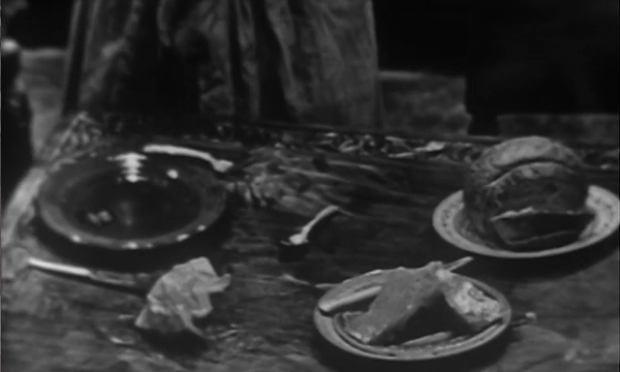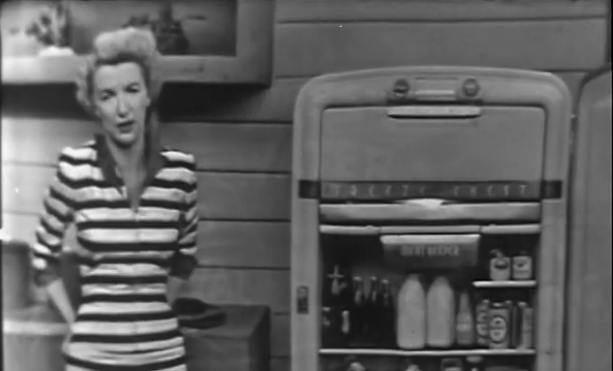What I watched: An episode of Studio One, an anthology drama series created by Worthington Miner. This week’s episode was an adaptation of Emily Bronte’s novel Wuthering Heights, starring Charlton Heston, Mary Sinclair, Richard Waring, June Dayton, Lloyd Bochner and Una O’Connor. The adaptation was written by Fletcher Markle and Lois Jacoby and directed by Paul Nickel. This episode first aired on CBS at 10:00 PM on October 30, 1950, and is available to watch on YouTube.
What happened: We open amidst a windy winter scene, with a man in a top hat knocking at the door. The stranger asks if he can stay over, but the two people within tell him to leave, saying that the house is worse than the blizzard and that “the master” won’t be happy to find another person here. The friendly maid Nelly (O’Connor) takes the man to a guest bedroom, where he finds an inscription on the windowsill. When he tries to close the window, he’s interrupted by Charlton Heston, who keeps the window open for “Cathy.”
We then flash back to many years ago, where Catherine and Master Hindley are young siblings fighting with each other and appealing to their jovial father. Their father brings in a dirty young boy, who was apparently starving on the streets of Liverpool. Hindley is a real asshole to the new kid, while Cathy settles on teaching him how to speak proper English. Without a real name for himself, the family dubs him Heathcliff. He does look a little bit like a young Charlton Heston.
Three months later, Cathy and Heathcliff are fast friends, frequently spending time on the moors, thus thoroughly pissing off Hindley. We cut to this romantic scene, with young Heathcliff wearing what looks a lot like a leather jacket, and quickly segue into a later scene, with the grown-up actors (Heston and Sinclair) brooding on the same moor. Heston chomps down on the line “It’s getting darker Cathy. Not with the sun going down, but… in our hearts.” Hindley (Waring) has become the master of the house, and is further tormenting them. He shows up to personally banish Heathcliff to the stables.

Cathy falls and hurts her leg, and Heathcliff brings her to their neighbours, Edgar (Bochner) and his sister Isabella (Dayton). Heathcliff and Edgar are both very dramatic about a sprained ankle, but Edgar takes the opportunity to put the rizz on. Back at the Heights, Hindley complains about Heathcliff to their maid Nelly. He discusses a potential match between Cathy and Edgar, which makes an eavesdropping Heathcliff angry.
Hindley plays on Heathcliff’s poor status to tell him he has no choice. Cathy returns, and is evidently smitten with Edgar, but refuses to give up the moors. Heathcliff smashes his hands through the glass after overhearing this. She confesses to Nelly that she belongs to Heathcliff. After overhearing part of the conversation, Hindley comes in, shouting that Heathcliff has stolen his horse and fled.
After a Westinghouse spot advertising the ability to watch big college football games (like Harvard vs. Yale!), we return to find that Wuthering Heights has fallen upon poverty, with a drunken Hindley taking out his rage on his servants. Hey, at least you still have servants, bro. He is visited by Heathcliff, wearing a cool cloak, who now apparently has some money to support the house. Meanwhile, Cathy is living in luxury, creating art alongside Isabella.
Heathcliff visits Catherine, and says he should have married her. He doesn’t seem like he’s going to take “no” for an answer this time, but does eventually leave. Heathcliff plays dice with Hindley, who has wagered away all his money and lesser property. He finally puts Wuthering Heights on the table, and loses it. He then tries to strangle Heathcliff, but gets punched out. This guy is really kind of a jobber.

Catherine and Heathcliff get back to their old habit of fooling around on the moors. Things turn less playful when Catherine mentions that she is, you know, married. Heathcliff tries to get her to do a “blood brothers” thing. He heads to a dinner party at the Grange, but not before we see Hindley has a gun and is trying to work up the nerve to shoot him.
At the dance, Heathcliff puts the rizz on Isabella. Cathy takes her aside and tries to warn her that Heathcliff is only interested in her fortune, but she thinks Cathy is insulting her. Heathcliff tells Isabella that Cathy repels him, but that “I’d only destroy you.” I have to use that line some time. Scandalized by Heathcliff’s behaviour, Edgar says he should never visit again, but Cathy objects. They receive a letter from Isabella, saying she’s eloped with Heathcliff. Catherine freaks out.
The second ad break pitches us on a new Westinghouse refrigerator with a special defrosting system. We return to a sick Cathy seeing Heathcliff in the mirror. She begs Nelly to take her to the Heights again. Nelly tells a drunk and depressed Hindley that Cathy is dying, and he threatens to kill Heathcliff again, but shrinks when the man actually appears with Isabella in toe. He’s constantly berating her, saying that he’s trying to get her to hate him, and it seems to be working. Nice fellow.
Cathy is still dying of sadness, confessing to Nelly that there’s evil in her heart. She hears Heathcliff shouting for her outside the window, and obsessively lurches towards it. She runs into him and begs for them to be together, and he pleads for her to haunt him. Well, I have some good news about what genre of story you’re in. This takes us back to the “present”, with Hindley and Isabella as two of the wretched figures drinking together. Heathcliff is found on the moor, digging up Cathy’s grave amidst howling winds, and this is our (somewhat abbreviated) conclusion.
What I thought: I only recently read Wuthering Heights for the first time. As I’ve mentioned previously, I loved Jane Eyre, but I’ve had difficulty with the Brontës’ other works. Maybe it’s just my diminished attention span since my grad school days, but I found Wuthering Heights to be something of a slog, hundreds of pages of brooding without a really strong propulsive plot. Obviously it was a hugely influential book in the history of gothic literature, but as I get older I’ve become more willing to just admit it when I don’t enjoy reading a Great Book.
The Studio One version of Wuthering Heights was a bit more my speed. The novel is a difficult one to adapt due in large park to its baroque plot structure, which involves multiple time frames, a story-within-the-story frame narrative, and two different characters called Cathy. Studio One trims away the next-generation storyline which takes up much of the book’s last portion, and creates a more focused narrative based on the Catherine and Heathcliff relationship that everyone remembers.

The visual format also helps to make this narrative more memorable to me. Even with the relatively cheap sets of 1950 television, the visual image of Cathy and Heathcliff on the moor helps to sell this as a romance the characters are desperate to return to much more than the abbreviated script would do on its own. The sets also do a good job contrasting the atmosphere of the two estates – the doomed Wuthering Heights and the proper and innocent Grange.
None of the characters have a great deal of psychological depth, especially villainous Hindley, but the talented cast do their best to make them memorable. Charlton Heston is not a great fit for a Byronic hero, as in Jane Eyre – he’s not a man you can imagine society looking down on. But his raw charisma and masculine presence make up for that, and if nothing else it makes it immediately clear why Catherine and Isabella can’t resist him despite all logic.
Whatever my gripes about Emily Brontë’s prose, Wuthering Heights is still a vital story, and one that set the template for many romance narratives today, pairing a noble woman with a primal, less civilized but undeniably magnetic men. The tropes introduced by Bronte are still present in contemporary shows like Outlander. Studio One leaves out a lot of the book’s wrinkles, but is effective at conveying its core appeal, which is all you can really ask a one-hour adaptation to do.
Coming up next: It’s finally time for Halloween on Kukla, Fran and Ollie.
